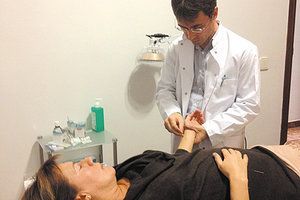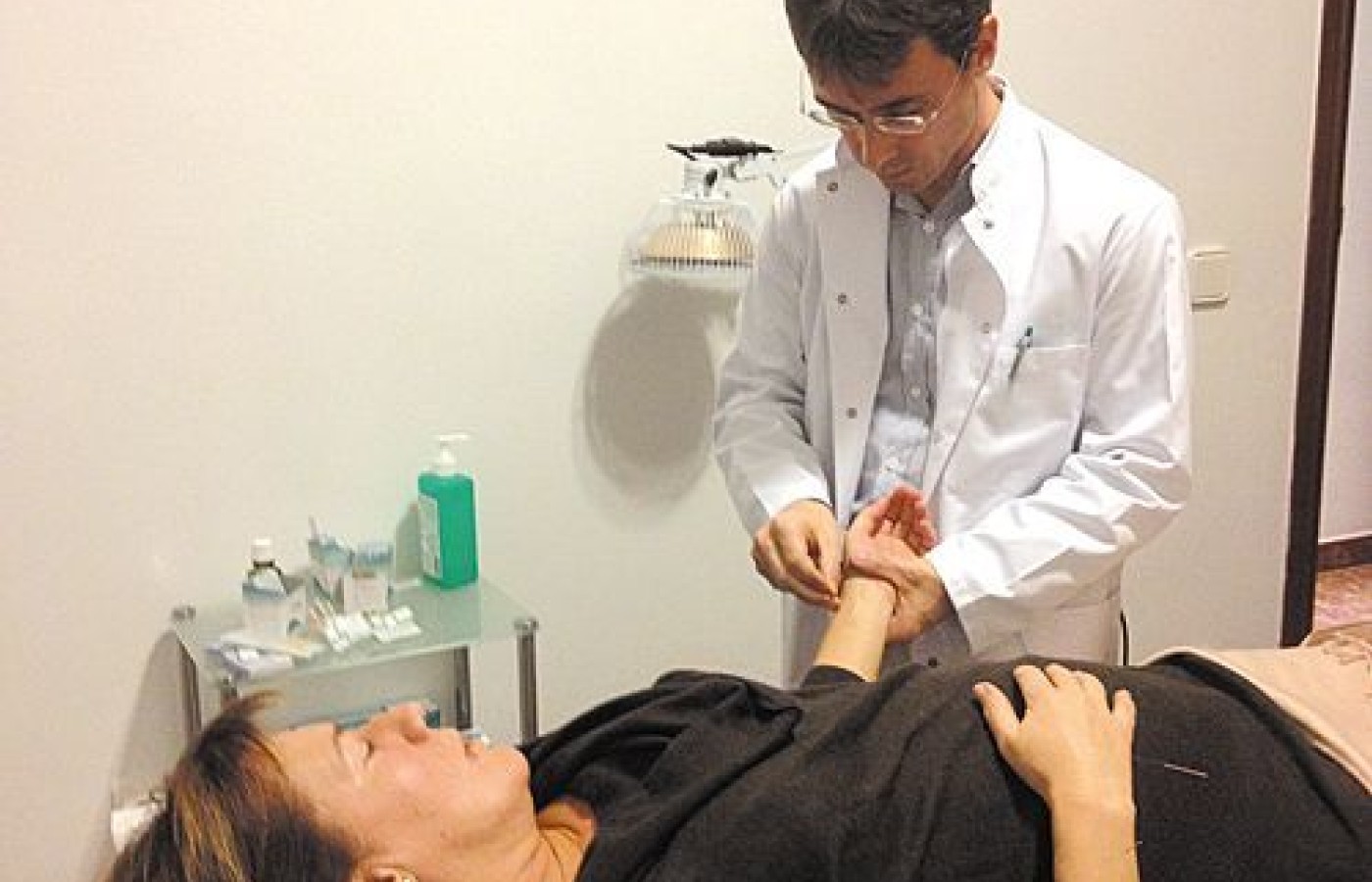The most important relationship I seek to nurture in the treatment room is the one a patient has with their own body. We live in a culture that teaches us to override pain, defer to outside authority, and push through discomfort. Patients often arrive hoping I can “fix” them, but the truth is, we can’t do the work for them. We can offer guidance, insight and support, but healing requires their full participation.
Speaking In Western and Eastern Terms: A Chat With Phillippe Sionneau, OMD
The likes of anthropologists, medical practitioners and modern day philosophers are talking about community interdependence and so is the burgeoning global community of the Chinese Medical profession. As we've seen in the past five years or so, alternative medicine has shifted to the forefront of mainstream medicine, making it a strong cohesive force in the international integrative health and wellness arenas.
All around us we're seeing urban, community based clinics popping up, the inclusion of Chinese medicine and acupuncture in large universities and hospitals and acupuncture stretching to far-reaching locations where medical treatment was once scarce. The common theme-infusing community interdependence through integrative medicine. While much of what we're experiencing in the medical community here and abroad is a huge push toward a more evidence-based approach to practice, some devout practitioners of the classical style suggest the proof of the medicine's power can be found in its subtle and lasting immaterial traditions.
One thing everyone in the greater Chinese medical community can agree on with praise is that the availability of Chinese medicine is more abundant globally than ever before. With the rise of new social media and mass networking across the web, what was once an abstract concept that only some had heard of is now being experienced first-hand as an affordable, sustainable, viable and life-prolonging medicine.

As practitioners, we continually strive to learn from and wield the complexities of the medicine we hold near and dear. Recently I enjoyed the opportunity to discuss the experiences of a well-known European practitioner, Phillippe Sionneau, OMD. His interpretations of Chinese medicine holds valuable insight into the importance of upholding, teaching and preserving the classic principles while engaging an integrative approach to reach wide geographic regions.
He is the author of 24 popular books used in Chinese medical schools globally as well as countless articles and interviews. A long time practitioner & advocate of classical Chinese medicine, Phillippe's research focuses on psycho-emotional disorders, fundamental theories according to the ancient classics and food therapy principles. He has also devised a glossary of Chinese medical terminology used throughout academia and private practice alike.
Discovering Healing Through The Foundations of The Classics
Christine Dionese: As an integrative health care specialist, I find myself speaking simultaneously in Western and Eastern terms offering anecdotal information my patients can identify with. As we continue to evolve and become more interdependent globally and integrated medically, what advice or thoughts can you offer new practitioners of Chinese medicine to assure their confidence that the classics will reveal the true nature of healing to patients?
Phillippe Sionneau: I think that we need to separate two distinct concepts: our relationship with our patient and the medical world on the one hand, and our understanding and application of Chinese medicine on the other.
Our modern world is governed by Western culture and science. They have become our framework. Therefore, we need to study Western medicine in order to communicate with the mainstream medical community. We must be able to interpret the language of Western medicine so that we can exchange ideas with other health professionals. In addition, our patients think within this Western medical framework. For example, they can easily understand the concept of "inflammation of the lungs", but it is less easy for them to understand "wind heat attacking the lung." When patients ask me for an explanation, I tend to use their language, their cultural framework, and not that of Chinese medicine, which is completely foreign to their concept of the world. If my goal is to make myself understood by my patients, I am not going to give them a lecture on Chinese medicine or Taoism! We must be practical and efficient: speak their English, not Chinese!
So, when I am trying to communicate with the medical community and patients, I use the logic, terminology and concepts that are understood by my Western patients, and this is where it stops! Then, on my own, I develop my analysis, my diagnosis, and put a treatment strategy into place within a Chinese framework. When we are practicing medicine we must think in terms of "Chinese medicine". In our Western minds, despite ourselves, we tend to think that the future brings progress or improvement. We think that what we discover later will be much better than what we know today. This is true for modern science, but it is often false for Chinese medicine. The real treasures of Chinese medicine are already there; they wait for us within the key texts that are sometimes referred to as the "Classics." All of the practitioners who have amazed me within Chinese medicine, in China or in the West, are almost always those who use a very "classic" approach. So the only thing that I would like to say to young practitioners is you have a very powerful healing modality in your hands. To implement this powerful modality you need two things: 1. Have confidence in your art, 2. Continue to return to a more classic approach to Chinese medicine." It is after you obtain your diploma and acupuncture license that the real study begins. To summarize, we must use a very Western approach when communicating with doctors or patients, and we must use a completely "Chinese" approach when we treat. Chinese medicine is an incredibly powerful tool. But in order for it to be effective, it needs to be applied the same way as it was thought of 2,000 years ago, and thus brought back to it's origins.
CD: How do suggest immaterial and invisible concepts such as qi, yin and yang be preserved amidst the great shift to integrate Chinese medicine with other health and wellness modalities? How do you think Western medical practitioners can learn from these principles?
PS: To answer the first question, I would say that the real challenge within Chinese medicine is to resist Western culture. It's obvious that the confrontation with our Western science, culture and medicine has influenced the ways of teaching and practicing in modern China. Many people ignorantly claim that Communism and Mao Zedong completely altered the original Chinese medicine. This is totally false. It is not the communists who have altered Chinese medicine, but rather Western medicine and the confrontation with the West. We should not try to combine Chinese medicine with other modalities, or try to understand it based on other systems of thought. We can integrate it with Western medicine and with the modern health care system, but we certainly cannot modify it to better fit into our modern world. Any distortion makes it less powerful. We must recall the obvious: the goal of medicine is to treat patients who are suffering, not to create a new profession. The essence of Chinese medicine needs to be preserved, because it is in it's most pure state that it is the most effective and most beneficial for our patients.
Can Western doctors learn from Chinese concepts? I do not know. I don't think that a basketball player will get better using the techniques of a football player. They are two opposite worlds. OK, they are two sports that ultimately have the same goal, but they have completely different rules and demand completely different skills. I am convinced that there is value in combining the two medicines, but not in modifying one with the other.
CD: In the spirit of healing, when faced with our imminent global concerns such as environmental awareness, do you think patients will be more inclined to identify their whole body health as a reflection of nature through these principles (that we just discussed above)?
PS: I think that the majority of our patients do not want to be transformed into Taoists, they do not want to change their habits and do not want to change their way of thinking. That's the reality. So, you can attempt to educate your patients about the concepts of qi, yin, yang, five phases, etc., but this will only reach a very small percentage of our patients. What they want is a solution to their health problem. In my experience, I get them to make better changes in diet, physical activity, stress reduction, change in attitude etc. when I explain things in their language rather than using Chinese concepts. I'm not trying to transform my patients into Taoist sages, because what they want above anything else is to just feel better. So I try to be efficient and practical, and this is why I speak their language. I speak "Western" on the outside and I think "Oriental" on the inside. Many do the opposite: they have a very Chinese discussion with their patient, but ultimately apply Chinese medicine based on Western concepts, without even realizing it. We need to reverse these trends.
CD: Patients visit our practices with a myriad of expectations. As a reflection of how you commented about nature and healing, what is your special way of teaching patients about how they can heal and grow over time?
PS: First, I am convinced that the large majority of illnesses come directly from our lifestyle: diet, physical activity, overwork, stress, pollution in the air, water and food, toxins in cosmetics, unnecessary drugs, etc., but I do not try to educate my patients about these things right away unless it is imperative. My approach is generally as follows:
1- I try to be myself, I do not play a role; I do not act like some Taoist sage because I am neither wise nor Taoist. 2- I try to obtain good results as quickly as possible in order to gain their confidence. 3- When I get to this point, which is not always the case, I explain that a part of their problem comes from their way of life, from how they eat, think, move, etc. From there, I set up short gatherings that are free of charge in order to talk to several patients at once about important ideas regarding their lifestyle. Then, they can decide whether to apply these ideas or not. I can show them the way, but I cannot walk the road for them.



